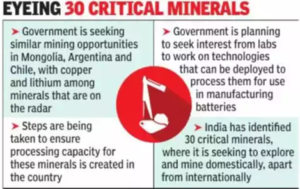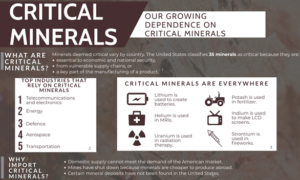Critical for a Green Future.
Relevance
- GS Paper 1 Distribution of Key Natural Resources across the world.
- Tags: #CleanEnergyTransition #AtmanirbharBharat #G20Presidency #UPSC #IndianExpressEditorialAnalysis #GS3.
Why in the News?
As the G20 Leaders’ Summit approaches in New Delhi, the spotlight is on the crucial role of critical minerals in advancing the clean energy transition and India’s strategic efforts to secure its supply.
Critical Minerals: Building Blocks for Clean Energy Transition
There is a widespread agreement on the significance of critical minerals in facilitating the clean energy transition.
- G20 Energy Transitions Ministers’ Meeting The outcome document highlights the importance of maintaining reliable, responsible, and sustainable supply chains for critical minerals and materials.
- Critical minerals, including cobalt, lithium, silicon, graphite, and rare earth elements (REE), are crucial for a nation’s economic and national security. They lack viable substitutes.
- Clean Technology Use These critical minerals are integral components in clean technologies such as solar modules, wind turbines, and batteries, which play a vital role in achieving India’s sustainability goals, including 500GW of non-fossil power capacity by 2030 and a 45% reduction in emissions intensity below 2005 levels by 2030.
- Building Blocks of Modern Civilization: Given their essential role in clean energy technologies, these minerals can rightfully be described as the foundation of modern civilization.
Rising Global Demand for Critical Minerals: Challenges and Opportunities
- The increasing global demand for clean technologies has driven an increase in the mining of critical minerals.
- A study conducted by the Union Ministry of Mines in partnership with the Council on Energy, Environment, and Water (CEEW) reveals substantial growth in annual production.
- Key minerals like lithium, rare earth elements (REE), and cobalt witnessed remarkable increases of 240%, 134%, and 67%, respectively, from 2016 to 2022. Some minerals, including cobalt, copper, and nickel, have already exceeded 2% of global reserves in current mine production.
- However, global supply networks for key minerals are complex and vulnerable to unforeseen interruptions caused by trade agreements, geopolitical circumstances, and disasters.
- Securing these supply chains is crucial for reducing import dependency, enhancing national security, and fostering domestic value chains to meet the surging demand for these vital resources.
Advancing Atmanirbhar Bharat: A Focus on Domestic Critical Minerals
- In pursuit of the Atmanirbhar Bharat goal, the Indian government, led by Prime Minister Narendra Modi, is firm in its commitment to strengthening the domestic essential minerals industry.
- This dedication extends to exploration, processing, usage, and recycling.
- Notably, significant policy improvements have been adopted through crucial modifications to the Mines and Minerals (Development & Regulation) Act, 1957, in 2015, 2020, 2021, and most recently in 2023.
- In order to increase local production sources, the Ministry of Mines implemented a New auction system in 2015.
- This regime streamlined the Process of granting mining licenses and composite licenses for mine development, ensuring transparency and timeliness.
- Additionally, the National Mineral Exploration Trust (NMET) collaborates with private agencies to support critical minerals’ exploration endeavors through funding.
- The 2023 MMDR Amendment Act further facilitates mining by introducing Exploration Licenses (EL) for deep-seated and critical minerals.
- Notably, it removed six minerals, including lithium, from the list of 12 atomic minerals, signaling a more comprehensive approach to mining policy.
Cooperative Federalism: State Revenue Boost through Mineral Auctions
- The government has launched Special auctions for 24 essential minerals as a show of cooperative federalism.
- The proceeds from these auctions will go directly to the relevant state governments, therefore improving their budgetary health and total tax receipts.
International Collaboration for Critical minerals
- To strengthen the critical minerals value chain, international cooperation through multilateral and bilateral engagements is vital.
- The government is building new partnerships and alliances, including India’s participation in the Minerals Security Partnership (MSP), the Australia-India Economic Cooperation and Trade Agreement (ECTA), and Khanij Bidesh India Ltd’s (KABIL) efforts to secure mineral acquisition opportunities in nations like Chile and Argentina.
- Collective action is crucial to meeting our targets and ensuring a resilient critical minerals supply chain.
The G20’s voluntary high-level principles on critical minerals, which include innovation, environmental and social governance, will improve our efforts to protect India’s important minerals for the future. Under India’s G20 leadership, the Prime Minister’s vision of “One Earth, One Family, One Future” emphasizes the importance of our common goals for emission reduction and climate change mitigation for a shared future. The foundation established during India’s G20 presidency will boost our efforts on vital minerals, with India taking the lead.
Source: Indian Express
Mains Question
What are the major challenges and vulnerabilities in global supply chains of critical minerals, and how can they impact India’s security and development?





